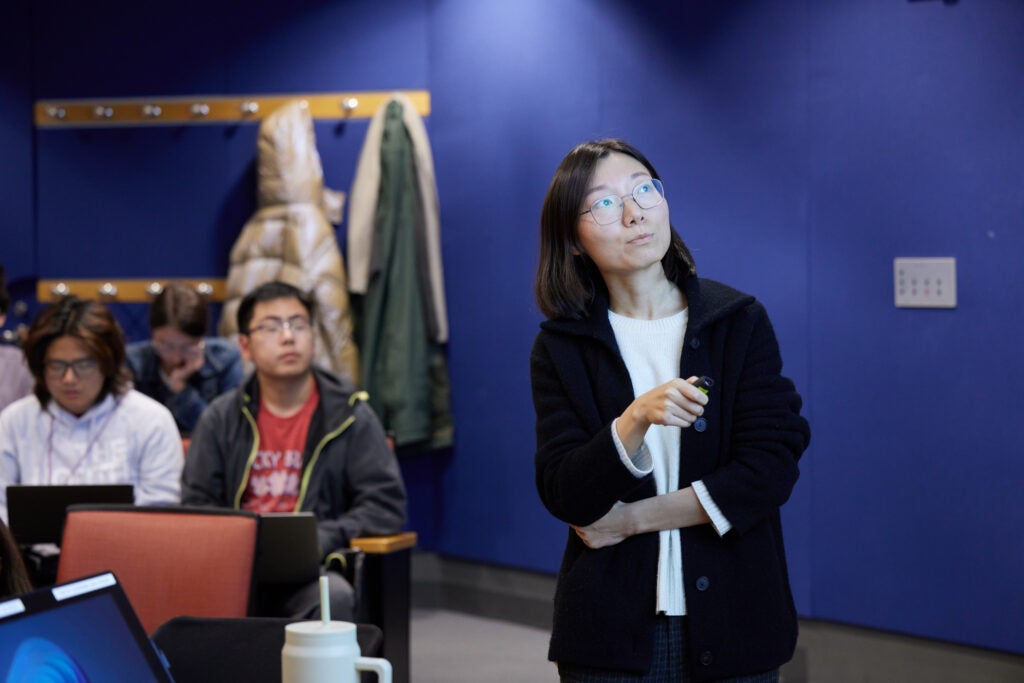Department of Biostatistics
The Department of Biostatistics tackles pressing public health challenges by conducting cutting-edge research and translation and by offering top-quality education and training.
655 Huntington Avenue Building 2, 4th Floor
Boston, MA 02115
Why Biostatistics?
The Department of Biostatistics at Harvard Chan School is a leader in research and education. We spend our days transforming data into global impact.
Through methodological innovation and applied statistical analysis, our researchers uncover problems that threaten people’s health and quality of life, such as the impact of noise exposure on cardiovascular health. We also use these methods to identify new approaches to protecting health, for instance by analyzing how cell phone use patterns to detect mood disorders.
Students in the Department of Biostatistics at Harvard Chan School receive a world-class education in and out of the classroom, guided by leading researchers and faculty. Students engage in rigorous courses designed to prepare them for the intellectual challenges ahead, while also benefiting from personalized attention and mentoring from leaders in the field.

Research with a global impact
Analyzing the damaging effects of noise
Professor Francesca Dominici analyzes huge data sets to ferret out hidden environmental causes of disease. A recent study was the first to analyze noise exposure near airports and its impact on cardiovascular disease.
Monitoring cell phone use patterns to assess mood disorders
Associate Professor JP Onnela is developing methods for analyzing and modeling social and biological networks. His group uses cell phone communication and sensor data to monitor the behavior and assess the well-being of individuals with mood disorders.
Exploring the microbiome’s role in immune function
Associate Professor Curtis Huttenhower received a Presidential Early Career Award from the White House in part for his work on the Human Microbiome Project, which analyzes the role our internal microbe colonies play in maintaining health and immune function.
Mining medical records for clues to complex diseases
Professor Tianxi Cai has worked on an algorithm to scan electronic medical records (EMRs) to better understand the genetic basis of complex diseases.
Assessing the safety of medication used during pregnancy
Director of Graduate Studies Paige Williams is working on a study about the safety of antiretroviral (ARV) medication use during pregnancy.
Where can biostats take you?
Our alumni are thriving in a wide range of careers in academia, business, nonprofit organizations, and the government.
Explore how some of our alumni have thrived in academia.
Subspecialties in biostatistics research
Bioinformatics & Computational Biology
The Department of Biostatistics offers a variety of educational and research opportunities in computational biology and bioinformatics, including training doctoral students to develop novel computational and statistical methods for biological data analysis.
Collaborative research opportunities include
- Investigations of epigenetic modulators of health with respect to environmental exposures
- Host- and population-wide mutation analysis and host-pathogen interactions for a number of infectious agents
- The metagenomic roles of the human microbiome in disease
- Functional analyses of single nucleotide polymorphisms and structural variations
- The mechanisms tying stem cell differentiation and proliferation to cancer.
The Longwood Medical Area offers rich collaborative opportunities with Harvard Medical School and affiliated research hospitals. Cross-registration is available for courses offered by other Harvard institutions.
Statistical Genetics
Statistical geneticists at the Department of Biostatistics develop methods for understanding the genetic basis of human diseases and traits. These methods use both unrelated and related individuals and involve large-scale data sets from candidate-gene, genome-wide, and resequencing studies.
Our statistical geneticists collaborate with other investigators at the School and around the world on studies of:
- cancer
- heart disease
- diabetes
- respiratory disease
- psychiatric disease
- health-related behaviors (e.g., smoking, diet)
They also have close ties to the Program in Quantitative Genomics and Computational Biology and Bioinformatics group. Training encompasses basic statistics, Mendelian and population genetics, the design and analysis of genetic association studies, gene expression and epigenetic markers, and gene-environment interaction.


